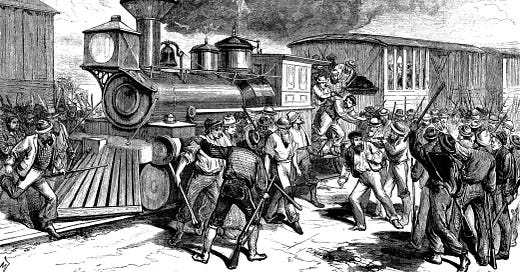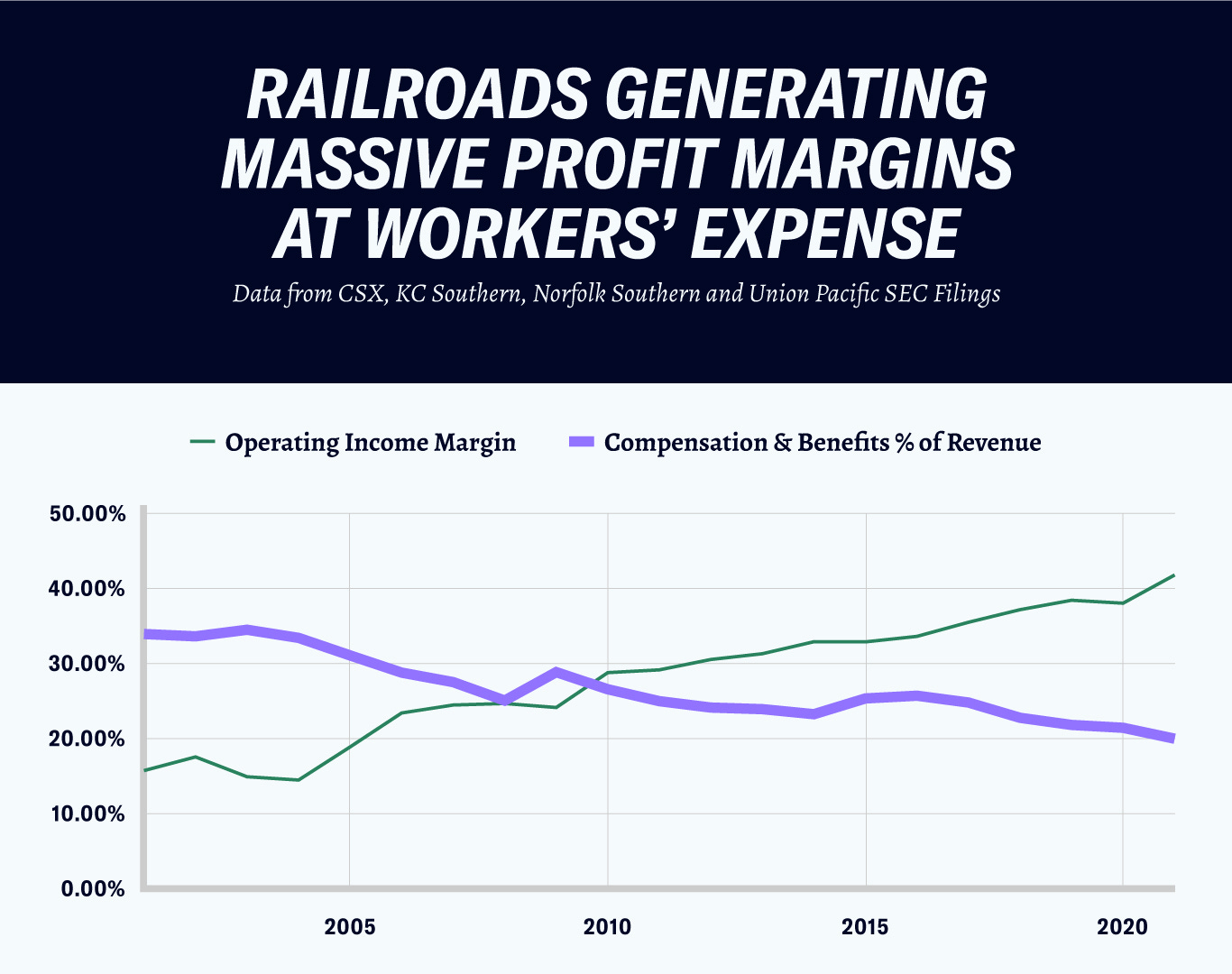The one thing you need to know about the railroads
It's not that a rail strike would be bad for the economy
Yesterday, the House approved legislation to avert a nationwide rail strike by forcing railroad workers to abide by a tentative agreement that the Biden administration helped broker earlier this year. (The proposal failed to win the approval of the workers at all of the unions involved.)
Later today, the measure was approved in the Senate. (The House also approved a separate measure to add seven days of compensated sick time, but it may lack enough bipartisan support to pass the Senate.)
Let me be clear. A strike and shutdown of the nation’s railroads would be terrible for the economy. It would worsen inflation.
But legislation effectively prohibiting a strike would impose unfair working conditions on employees in one of the most profitable industries in America — further tilting the nation’s economic imbalance toward large corporations and Wall Street, and against working people.
Here, a concentrated industry has gained record profits by understaffing — squeezing its workers to the breaking point. Prodded by Wall Street, the big rail companies have intentionally gutted their own spare capacity.
Last year, adjusted operating margins for the five largest US railroads were 41 percent. Ten years ago, they were 29 percent. Two decades ago, they were 15 percent. Even compared with other transportation companies (which are doing extremely well)— trucking, parcel, air freight, maritime shipping, airlines – today’s railroad profits are humongous.
Union Pacific, the largest publicly traded US railroad, paid its investors more than $41 billion in dividends and share buybacks over five years through 2021. In the first six months of 2022, it heaped an additional $5 billion on them.
Why are railroads so profitable? Largely because they’re spending so little on labor.
[Source: Eric Gardner, “Rail Strike By the Numbers,” More Perfect Union, September 13, 2022]
It’s called “precision scheduling” — a business model based on longer trains and fewer workers who have to be on-call almost any time.
This is why even as profit margins have swelled, the industry has rejected workers’ calls for sick leave, guaranteed time-off, and more predictable schedules.
Many railway workers are subject to grueling schedules that make it impossible for them to make medical appointments or deal with family emergencies. Conductors and engineers can be on call for 14 consecutive days without a break and do not receive a single sick day, paid or unpaid.
Trains once staffed with five workers are now staffed by two. (The current CEO of BNSF has called for one-person crews.) Nearly all employees are on-call virtually around the clock, expected to report to work within 90 minutes for shifts that can last nearly 80 hours -- not even including the time they’re sitting at terminals far away from home.
A new attendance policy at BNSF Railway, owned by Warren Buffett’s Berkshire Hathaway, requires workers to remain on-call for up to two weeks, able to be report for work at a moment’s notice. The policy, in place at other railroads, penalizes workers for taking time off — up to and including being fired.
Longer trains reduce the amount of labor per load, also contributing to fatter profit margins. Trains can be up to three miles long. But again, this means more work and less predictable schedules.
But workers have been fighting back. That’s why they’re threatening to strike.
Nobody wants a strike. But striking is the one tool available to them to gain some leverage.
Yet now the Biden administration and Congress are siding with the railroads and against workers — arguing that the public interest demands it.
But if the public interest demands it, why haven’t lawmakers intervened to require railroads to have more spare capacity before now? Why haven’t regulators demanded that railroads maintain a better ratio of labor per load, so railroad workers aren’t subject to these working conditions, and don’t have to strike?
I’m sure Joe Biden understands this. He was one of six senators who opposed the legislation that ended a 1992 railroad strike. At that time, he argued forcefully against congressional interference in labor disputes.
Yet now, like other top Democrats, he is citing the threat of economic harm as a more important.
Why is it that whenever lawmakers confront the social costs of corporate greed, they roll over? They allow the greed to prevail while penalizing workers and others who are most immediately harmed by it.
It’s the same at the Fed. Even as corporations score record profits, The Fed continues to blame inflation on American workers – and continues to crank up interest rates to slow the economy and shaft workers.
Yesterday, Fed Chief Jerome Powell said the biggest barrier to taming inflation is the shortage of workers, which is giving Americans greater clout to seek higher pay. “The labor market … shows only tentative signs of rebalancing, and wage growth remains well above levels that would be consistent with 2 percent inflation over time,” he said. “Despite some promising developments, we have a long way to go in restoring price stability.”
But wages aren’t the culprit. Wages haven’t even kept up with prices. Which is why the purchasing power of most workers has been declining. And why many workers – such as railroad workers -- are being subjected to the whims of corporations that couldn’t care less.
In the age-old battle between labor and capital, labor is taking it on the chin. In some respects, the US economy is back to where it was in the late nineteenth century.
After all, the Great Railroad Strike of 1877 began with a work stoppage by railroad employees in West Virginia protesting a reduction in their wages. Railroad workers in other states soon joined them. Commerce in the East and Midwest was seriously disrupted. The economy was threatened.
The strikes were ended within a few weeks, largely because the federal government sided with the railroads. President Rutherford B. Hayes called out federal troops to quell the strikes.
Honestly, how far have we come since then?





Contrast this to what has been happening the UK over the past few months.
Remember, the UK was the birthplace of both railroads (including the Stephenson Gauge for the width between rails in most counties) and many notions of U.S. capitalism.
The U.K. has seen multiple short rail worker strikes in the past several months over somewhat similar issues to what we have in the U.S. The strikes have not been general strikes but periodic work stoppages, which create havoc with schedules, and are finally disrupting profits of the for-profit operators.
Guess what? The rail companies are stating to come to table. The process is working without heavy-handed government interference. Maybe the "magic of the market"?
One a side note, let's not forget that HUGE subsidies were given to the U.S. railroads in the 1800s in terms of alternating sections land and section towns every few miles. The land was taken from the Native Americans, given to railroads, and then in large part sold off through developers. The railroads have also been bailed out several times in U.S. history with rescue packages, debt relief, exclusive rights of way protection, and regulated freight rates.
And they still cannot come to taking care of the people who work for them?
Have not come far and the robber barons have come full circle in 140 odd years. Good Lord! How does this continue to happen?
History just seems to repeat the lessons we are supposed to learn from! Perhaps because nobody reads history. Perhaps we’ve poisoned the historical well. The real power brokers study history incessantly so as to bring about the same historical results! That’s the reason we have to study history folks! We have to stop them from repeating the same scenarios which put them in power. The American Experience is repeat in repeating ancient power games. These elites are very good at history! It’s their lifeblood! Otherwise, how would they know how to manipulate the populace? It’s like a deadly serious ballgame in which we are the Brooklyn Dodgers and they are the mighty New York Yankees. We are locked in a deadly mortal combat with all those well researched and well strategized elites who know their game very well while we do not even know what the game is. They play multi-level chess while we play checkers. They play with real kings and bishops and real knights and we play with facsimiles of those key players. We play for pennies and they play for billions! The current railroad crisis is but another example of the common persons fight to stay alive using moral grounds as currency against real dollars and a-morality as currency on the other side. We the people need to know the real history instead of an idealized and sanitized history written by the elite class to placate our stilled voices. The real history my friends!